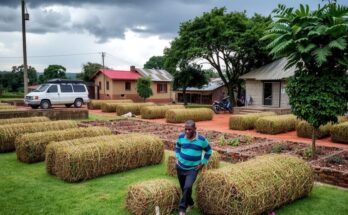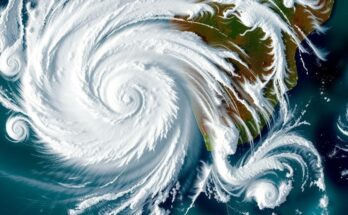This article by Jason Hickel explores the interconnectedness of Palestinian liberation, ecological crises, and global capitalism. He contends that capitalism, operating along imperial lines, exacerbates environmental degradation while perpetuating social inequalities, especially affecting the Global South. Hickel argues for economic democracy, asserting that the struggles for liberation in these nations pose a direct threat to the capitalist interests of the Global North, highlighting the urgent need for changes to existing production systems to achieve a just and sustainable future.
The liberation of Palestine is intrinsically linked to a wider liberation of the Middle East, which poses a substantial challenge to the existing structures of global capitalism. Jason Hickel, in his discourse, argues that the ecological crisis we face is not merely an environmental issue but rather a manifestation of deeper capitalist imperialism that operates along colonial lines. The production systems controlled by the ruling classes of the imperial core are responsible for the majority of carbon emissions contributing to climate change. Meanwhile, countries in the Global South, which have contributed little to these crises, bear the brunt of the negative impacts, highlighting an unjust distribution of ecological burdens. Hickel emphasizes that despite the vast productive capabilities available globally, a significant portion of humanity continues to experience deprivation. The paradox arises from a capitalist system where production is relentlessly geared toward profit maximization for the ruling classes rather than the fulfillment of basic human needs. This system of production leads to a degradation of ecological conditions and amplifies social inequalities. The crux of Hickel’s argument is the need for economic democracy—essentially, a system where collective democratic control governs production goals. He asserts that true progress toward solving issues like poverty and climate change is stifled by the lack of autonomy afforded to nations in the Global South. Therefore, to achieve ecological transition and economic sovereignty, these countries must engage in struggles for liberation from structural constraints imposed by the Global North. Ultimately, Hickel posits that the United States and other imperial powers react violently to liberation movements in the Global South due to the existential threat they pose to their capitalist interests. A liberated Palestine symbolizes not just a victory for its people but a potential shift in the balance of power that could destabilize capitalist economies. Thus, the international community’s focus should recognize the broader systemic implications of these struggles for liberation.
The discussion surrounding the liberation of Palestine extends beyond regional politics; it intersects significantly with global economic dynamics and ecological concerns. Jason Hickel presents a comprehensive analysis of how capitalism operates as an imperial structure that exacerbates ecological crises while perpetuating social inequalities across nations. He outlines the disparities in resource consumption, production methods, and the impacts of climate change between the Global North and Global South. This discourse highlights the urgent need for comprehensive changes to systems of production to alleviate poverty and environmental degradation, underscoring the role of economic democracy as a fundamental resolution to these intertwined crises.
In conclusion, the liberation of Palestine is emblematic of broader struggles faced by nations within the Global South against an entrenched capitalist system that prioritizes profit over human welfare and ecological sustainability. Hickel’s arguments elucidate the connection between economic sovereignty, ecological justice, and the necessity of empowering marginalized communities in the Global South. Without addressing the underlying issues of capitalist imperialism and advocating for economic democracy, the prospects for sustainable development and equitable resource distribution remain bleak. Such struggles are not only morally imperative but also crucial for stabilizing and transforming the global economic order.
Original Source: scheerpost.com




